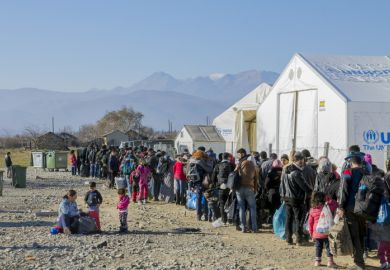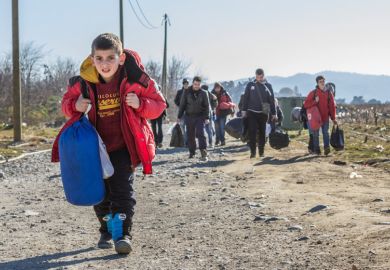Universities can help refugee students by giving out micro-loans or grants needing minimal paperwork to help with rent or health emergencies, according to an analysis that looks at how campuses in Germany can better assist their studies.
About 900,000 migrants entered Germany in 2015 – most of them much younger than the rest of the population – although the rate has slowed considerably.
Since then, just over 10,000 refugees have enrolled in university courses, according to an estimate earlier this year from the German Rectors’ Conference, which says refugee academic integration “continues to progress well”.
But this figure is “a rather low percentage” given how many have come to Germany, says Lisa Unangst, a researcher at Boston College in the US, who has recommended a series of changes to the German system that she said could also be useful advice for universities in other countries hoping to educate refugees.
Several universities – including the University of Dundee, Georgia State University and Victoria University of Wellington – have already brought in micro-grants or loans to help low-income students.
These are offered in addition to normal lines of student funding, and designed to cover gaps in rent or health emergencies, Ms Unangst said. There is some paperwork involved in accessing the money, but “it’s not designed to be burdensome”, she said.
Existing student grants and loans for low-income students in Germany are often insufficient to cover actual living costs, according to Ms Unangst’s paper, “Refugees in the German higher education system: implications and recommendations for policy change”, published in Policy Reviews in Higher Education.Three-quarters of students on university preparatory courses for refugees rely on such assistance.
German universities – which have less of a tradition of student services than their more residential counterparts in the US or the UK – should create “emergency funds for small, immediate financial needs”, recommends Ms Unangst’s analysis, based on interviews with university staff dealing with refugees. Campuses could also offer food banks, bicycle clinics, and book and computer exchanges, it suggests.
Another factor holding German universities’ integration efforts back was inadequate data collection, she said, a consequence of privacy concerns. This meant that universities generally only had data based on voluntary surveys that identified only the region students were from – not the country – and did not record what languages they could speak.
Refugees will also struggle to break into the most competitive subjects, such as law and medicine, which require “almost perfect academic performance” at the high school level to win entry, the analysis finds. They are also included in capped international student totals, meaning “students from Afghanistan are competing against graduating secondary school students from Brazil and Canada for a limited number of spaces”.
But any tinkering with Germany’s selection system – which covers just under half of courses, typically science, technology, engineering and mathematics, with the rest having no selection – to give refugees preferential access could be controversial, Ms Unangst said.
There also seemed to be a “profound lack of information sharing” between universities about how to integrate refugees, the analysis found. “None of the people I interviewed discussed best practice from other universities,” she said. “There’s clearly work to be done,” she added.
Register to continue
Why register?
- Registration is free and only takes a moment
- Once registered, you can read 3 articles a month
- Sign up for our newsletter
Subscribe
Or subscribe for unlimited access to:
- Unlimited access to news, views, insights & reviews
- Digital editions
- Digital access to THE’s university and college rankings analysis
Already registered or a current subscriber?







